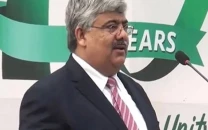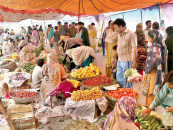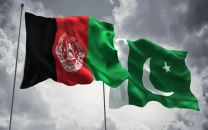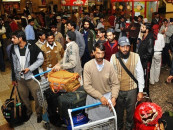EV industry demands policy changes
Calls for tax relief, localisation incentives, financing support to boost adoption
1733260913-0/image-(6)1733260913-0-640x480.webp)
Assemblers and dealers of electric vehicle (EV) motorbikes have urged the federal government and the Engineering Development Board (EDB) to incorporate a charter of demands into the upcoming New Energy Vehicle (NEV) policy. These demands include tax exemptions, free registration for bike customers, bike financing, and industry support for localisation to reduce prices and accelerate growth in the emerging NEV industry.
Approximately 40 EV motorbike brands with original designs have emerged in Pakistan, with sales reaching 3,000 units per month. The government aims to increase the share of EV bikes to 30%, achieving 500,000 units annually by 2028 in the local market.
EV and NEV assemblers have requested the EDB to allow zero or 1% import duties on Completely Knocked Down (CKD) units and to abolish taxes ranging from 1% to 40% on various bike parts. Free registration and accessible financing options will enable more local customers to transition to EVs. The industry could thrive within five years if stakeholders, including the EDB, the Ministry of Industries and Production, associations, and investors, actively support its development.
Despite the availability of stylish bikes worldwide, Pakistani customers currently pay around Rs240,000 for gasoline-powered 125cc bikes and Rs550,000 for 150cc motorcycles, which lack modern features and comfort. Given proper incentives, customers are likely to opt for upgraded and futuristic NEVs, overcoming challenges like poor resale value and a limited network of dealers and mechanics.
NEV industrialists plan to increase investments in research and development (R&D), localisation, and charging infrastructure to promote environmentally friendly products. To foster growth, improve sales and localisation, duties on all NEV components must be reduced to zero or 1%. The current 1% General Sales Tax (GST) on sales and 18% GST on imports should be eliminated to lower prices and facilitate customer adoption. Removing the 18% GST on imports could enable EV assemblers to cut prices by the same percentage, directly benefiting consumers.
NEVs are generally more expensive than gasoline vehicles, but two strategies can reduce costs: tax exemptions and localisation.
Speaking to The Expess Tribune, ETURBO CEO, Sheikh Osama Nadeem, explained the importance of bulk sales, stating, "We need to convert this product into mass-market adoption with the help of the government and industry players. We established an NEV industry in China three years ago, focusing on R&D equipped with state-of-the-art technology and machinery. Recently, we launched the ETURBO EV bike in Pakistan. With a good sales volume and a sustainable government policy, we aim to relocate our industry from China to Pakistan."
Senior auto sector analyst, and dealer, Muhammad Sabir Shaikh also highlighted the need for rapid localisation to save foreign exchange. He recommended the government urge assemblers to locally produce bike frames in the first phase and financially support the 700 auto parts and plastic component factories in the country to make all kinds of lights etc used in motorbikes.
He also pointed out that manufacturing NEV bike motors is feasible, as the ceiling fan industry in Gujrat already produces similar motors. For batteries, the government should provide incentives to local battery manufacturers, following India's model, to quickly develop this critical component. Achieving 70-80% localisation could dramatically lower motorbike prices while ensuring a cleaner environment, especially during the smog-prone winter season.
Exciting features
NEV bikes come equipped with innovative features such as reverse control to secure the bike on inclines, Bluetooth speakers, USB chargers, and an emergency switch allowing riders to travel 20kms in case of a fault. Affordable spare parts and trained technicians are now available at assembly units and showrooms.
Meanwhile, well-placed sources report that the EDB has shortlisted 10 NEV assemblers to supply 40,000 units, which will soon be offered to customers at subsidised rates via an e-portal. The World Health Organisation (WHO) has also pledged funding to developing countries for NEV adoption, aiming to phase out gasoline vehicles, combat climate issues, and promote clean environments globally.



















COMMENTS
Comments are moderated and generally will be posted if they are on-topic and not abusive.
For more information, please see our Comments FAQ